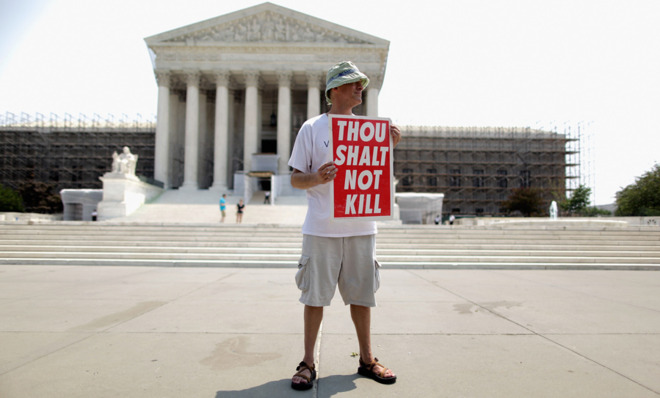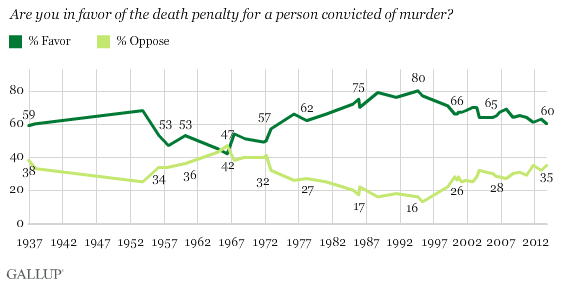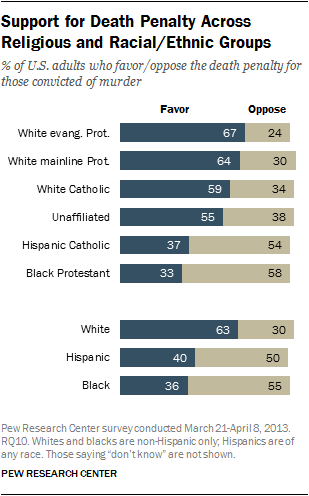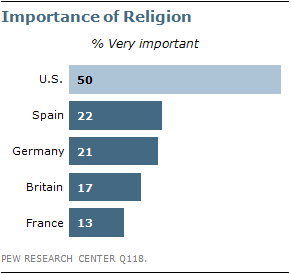Why is secular Europe so much more Christian on the death penalty?
Only 5 percent of Americans believe Jesus would support capital punishment. Yet at least 55 percent support it themselves.


A free daily email with the biggest news stories of the day – and the best features from TheWeek.com
You are now subscribed
Your newsletter sign-up was successful
A big reason that last week's execution in Oklahoma was botched is that the new, secretive combination of drugs evidently failed to kill convicted murderer Clayton Lockett. And the big reason Oklahoma and other states have been scrambling to find new lethal combinations or suppliers is that in 2011, the European Commission slapped a Europe-wide ban on exporting pentobarbital, sodium thiopental, and six other barbiturates to the U.S. because they might be used for "capital punishment, torture, or other cruel, inhuman, or degrading treatment or punishment."
In case that wasn't a clear enough message, EU foreign policy chief Catherine Ashton was explicit: "The decision today contributes to the wider EU efforts to abolish the death penalty worldwide." That decision followed ones by Britain and other countries, plus individual drug companies, to stop selling potential execution drugs to the U.S.
As British comedian John Oliver noted Sunday, Europe's history with capital punishment is brutal and long, but these days, the death penalty is, generally speaking, anathema in Europe. Seriously, after Anders Behring Breivik murdered 77 people in Norway in a July 2011 shooting spree, he was sentenced to 21 years — the maximum penalty — in a relatively well-appointed prison cell.
The Week
Escape your echo chamber. Get the facts behind the news, plus analysis from multiple perspectives.

Sign up for The Week's Free Newsletters
From our morning news briefing to a weekly Good News Newsletter, get the best of The Week delivered directly to your inbox.
From our morning news briefing to a weekly Good News Newsletter, get the best of The Week delivered directly to your inbox.
In the United States, support for capital punishment is at a 40-year low, according to an October 2013 Gallup poll — but that low is 60 percent.

A Pew poll from March found a smaller majority, 55 percent, in favor of the death penalty. Gallup broke out its poll numbers by political party — in the latest poll, 81 percent of Republicans, 60 percent of independents, and 47 percent of Democrats supported capital punishment — but Pew broke it down by religion:

What's interesting about that (at least to me) is that Europe — the cradle of institutionalized Christianity — is famously, increasingly secular, especially compared with America. These two charts are from a February 2012 Pew study:

Looking at all this data, it's hard not to see some correlation between how Christian a Western society is and support for the death penalty. There are a few caveats. First, the correlation breaks down somewhat in individual European countries. While France and Britain feature some of the lowest levels of Christianity in Europe, they also have some of the highest levels of death penalty support, for example. And second, there are clearly other key factors at play, like race and generational differences. A Barna Group poll from last summer, for instance, found that only 42 percent of Christian baby boomers and 32 percent of Christian millennials agree that "the government should have the option to execute the worst criminals." But the larger Europe versus U.S. trend is pretty clear, as is the Pew religion breakdown. Just look at Pew's "unaffiliated" group, which is less supportive than all white Christian groups.
A free daily email with the biggest news stories of the day – and the best features from TheWeek.com
There is a vigorous debate among Christians about whether or not Jesus Christ would support the death penalty, and whether his disciples should. (Here's an argument in favor, and one against, if you're interested.) The Old Testament has a list of capital crimes, for example, and Jesus was a Jew, raised under Jewish law.
But while the Southern Baptist Convention supports the death penalty, most mainline Protestant denominations and the Catholic Church (the largest Christian denomination in the U.S., by far) are officially opposed under most or all circumstances. In the Barna poll from last summer, only 5 percent of Americans said they thought Jesus would support a government's ability to execute the worst criminals.
We will probably never know definitively what Jesus thought of the death penalty, outside of being its most famous victim, but he does talk about forgiveness a lot, and turning the other cheek, not taking an eye for an eye, and loving your enemy. This is probably the most challenging part of Christianity, because it doesn't feel natural to not take revenge on people who do the worst imaginable crimes, to leave judgment to God and not hanging judges.
I won't pretend to try and settle this argument. But it's probably worthwhile for Christians to reflect on why the increasingly agnostic Europeans are increasingly following what an overwhelming majority of Christian Americans believe Jesus would do regarding state execution of grave sinners, and Christian America is not.
Peter has worked as a news and culture writer and editor at The Week since the site's launch in 2008. He covers politics, world affairs, religion and cultural currents. His journalism career began as a copy editor at a financial newswire and has included editorial positions at The New York Times Magazine, Facts on File, and Oregon State University.
-
 How the FCC’s ‘equal time’ rule works
How the FCC’s ‘equal time’ rule worksIn the Spotlight The law is at the heart of the Colbert-CBS conflict
-
 What is the endgame in the DHS shutdown?
What is the endgame in the DHS shutdown?Today’s Big Question Democrats want to rein in ICE’s immigration crackdown
-
 ‘Poor time management isn’t just an inconvenience’
‘Poor time management isn’t just an inconvenience’Instant Opinion Opinion, comment and editorials of the day
